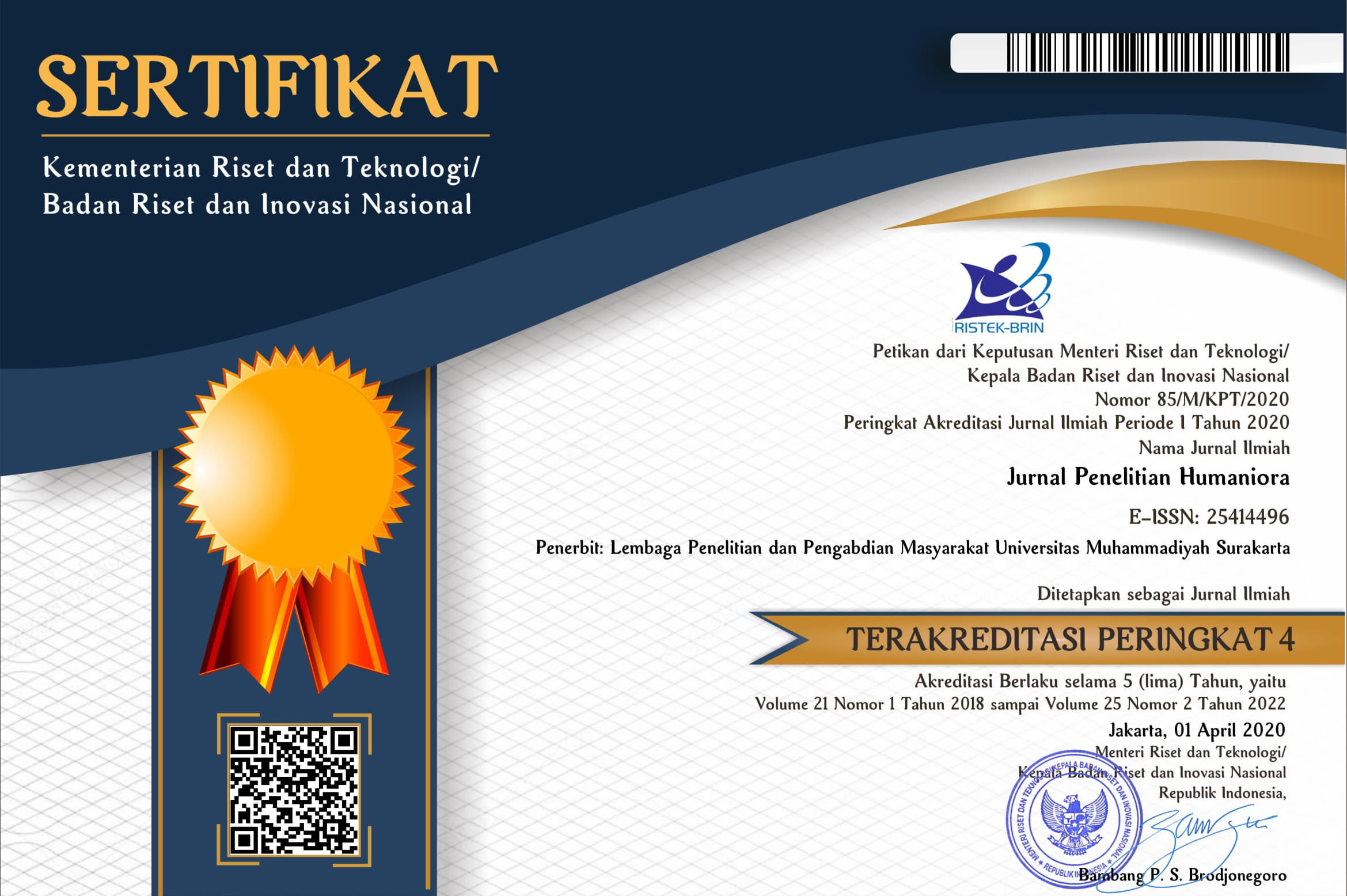TINDAK TUTUR MEMINTA OLEH PEMBELAJAR BIPA DARI KOREA: KAJIAN PRAGMATIK BAHASA ANTARA (INTERLANGUAGE PRAGMATICS)
Adista Nur Primantari(1*), I Dewa Putu Wijana(2)(1)
(2)
(*) Corresponding Author
Abstract
This study is aimed at explaining what causes the differences occurred in Indonesian
request utterances produced by Korean learners of Indonesian. The data used in
this research were taken directly from the fieldwork. The data were taken through
direct observation by recording and taking notes from conversations between Korean
people living in Yogyakarta whostudies Indonesian language. To collect the data,
the researcher distributed questionnaires. After collecting the data, the researcher
analyzed them in the area of pragmatics, compared the data between the Korean
and Indonesian speakers, and discussed the factors causing the differences. The
researcher reveals that the Korean learning Indonesian produce different request
utterance forms compared to the native speakers. The factors of request utterance
differences used by Korean learning Indonesian are mainly caused by linguistics and
non-linguistics factors. The linguistics factors are the impact of Korean pragmatics
knowledge transfer and the imperfection of grammatical knowledge meanwhile the
non-linguistics factors are cultural differences, intake of Indonesian learning, and
habit of using informal forms in daily conversation.
Keywords
Full Text:
PDFReferences
Achiba, Machiko. 2003. Learning to Request in a Second Language. Clevedan: Multilingual
Matters.
Blum-Kulka, Shoshana, Juliane House, dan Gabriele Kasper. 1987. Cross-cultural Pragmatics: Request and Apologies. New Jersey: Ablex Publishing Corporation.
Blum-Kulka, Shoshana dan Gabriele Kasper. 1993. Interlanguage Pragmatics. Oxford: Oxford University Press.
Brown, Penelope and Stephen Levinson. 1987. Politeness: Some Universals in Language
Usage. Cambridge: Cambridge University Press.
Lee, Iksop dan Robert Ramsey. 2000. The Korean Language. Albany: State University of New York.
Nadar, Franciscus Xaverius. 2006. “Penolakan dalam Bahasa Inggris dan Bahasa Indonesia:
Kajian Pragmatik tentang Realisasi Strategi Kesopanan Berbahasa”. Disertasi. Fakultas
Ilmu Budaya Universitas Gadjah Mada.
Park, J. 2001. “Korean EFL Learners’ Politeness Strategies in Their Complaints” dalam The Lingustic Association of Korea Journal, 9 (1) halaman 185-209.
Pateda, Mansoer. 1989. Analisis Kesalahan. Flores: Nusa Indah.Pratita, Ina Ika. 1999. “Tindak Tutur Permintaan dalam Bahasa Indonesia: Studi Kasus Tindak Tutur pada Ranah Keluarga di Surabaya”. Tesis. Tidak Diterbitkan. Yogyakarta: Universitas Gadjah Mada
Primantari, Adista Nur. 2012. “Analisis Kesalahan Berbahasa Indonesia pada Tataran Sintaksis oleh Pembelajar BIPA dari Korea”. Skripsi. Tidak Diterbitkan. Jurusan Sastra Indonesia, Fakultas Ilmu Budaya, Universitas Gadjah Mada Yogyakarta.
Rahardi, Kunjana Remigius. 1999. “Imperatif dalam Bahasa Indonesia: Kajian Pragmatik tentang Kesantunan Berbahasa”. Disertasi. Tidak Diterbitkan. Universitas Gadjah Mada Yogyakarta.
Sukamto, Katharina Endriati. 2012. “Polite Request by Korean Learnes of Indonesian” dalam Studies in Literature and Language Vol. 5, No. 2, Hal. 1-9. Canadian Academy of Oriental and Occidental Culture.
Wierzbicka, Anna. 1991. Cross-cultural Pragmatics. Berlin: Moyton de Gruyter. Wijana, I
Dewa Putu. 1996. Dasar-dasar Pragmatik. Yogyakarta: Andi.
Yule, George. 1996. Pragmatik. Yogyakarta: Pustaka Pelajar.
Zubaidi, Nanang. 2013. “Realisasi Keluhan oleh Pembelajar Asing Bahasa Indonesia: Kajian Pragmatik Bahasa Antara (Interlanguage Pragmatics)”. Tesis. Program Pascasarjana Program Studi Linguistik Fakultas Ilmu Budaya Universitas Gadjah Mada Yogyakarta.
Article Metrics
Abstract view(s): 782 time(s)PDF: 2700 time(s)
Refbacks
- There are currently no refbacks.











